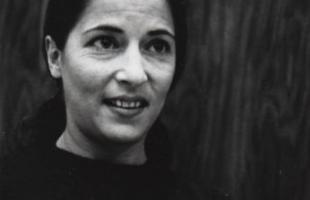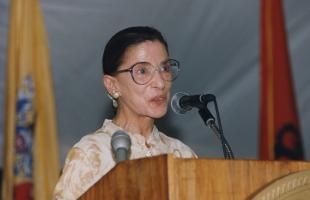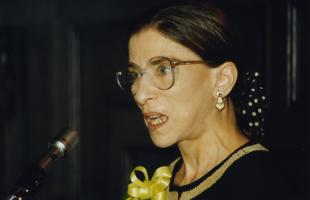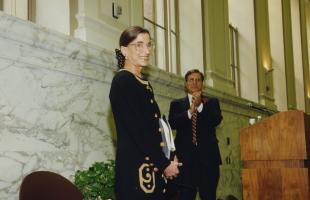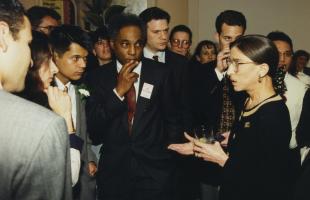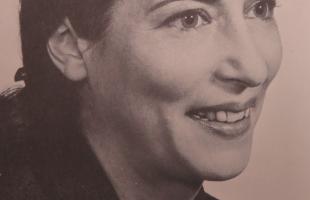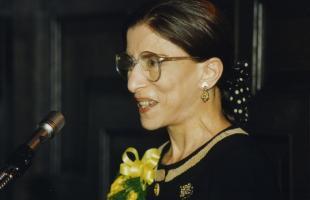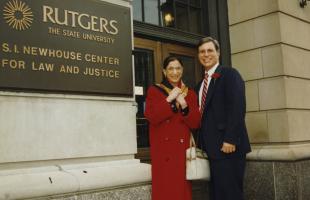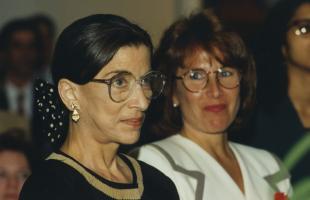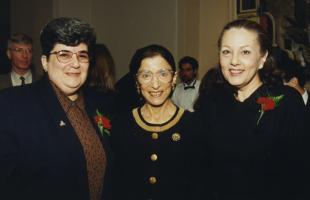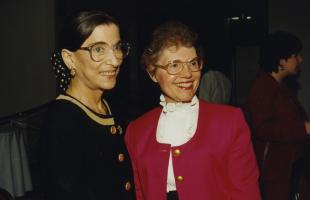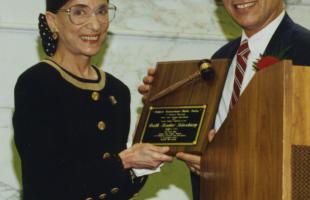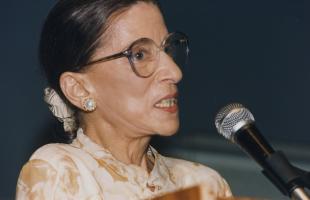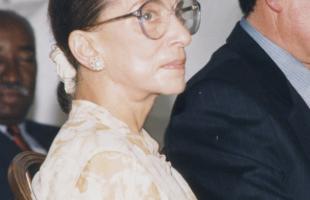In Memoriam
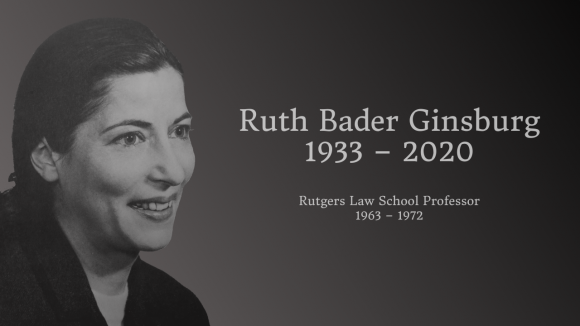
- Ruth Bader Ginsburg & Rutgers Law School in the News
- In the Words of the Justice
- Reminiscences from Alumni & Rutgers Colleagues
ESPER Stamps
Ruth Bader Ginsburg Stamp Reveal, Oct. 16, 2023, Rutgers Law School
Rutgers Law School Alumni, Faculty, & Administration
“One of Us: A Tribute to the Life and Legacy of Supreme Court Justice Ruth Bader Ginsburg,” The Power of Attorney, a podcast by Rutgers Law School
Diane Crothers, Vice Dean Rose Cuison-Villazor, Women's Rights Law Reporter
“Rutgers Law School: Where Ruth Bader Ginsburg Found Her Calling,” WBGO Journal
Co-Deans David Lopez & Kim Mutcherson
“Rutgers Law School, Where Ruth Bader Ginsburg Found Her Voice,” ROI-NJ
Rutgers Law School Students
“Rutgers Students Remember Ruth Bader Ginsburg,” News 12 New Jersey
Co-Dean Kim Mutcherson & Diane Crothers '74
“Rutgers helped shape Ruth Bader Ginsburg,” NJ Spotlight News
Professor Penny Venetis
“Ruth Bader Ginsburg's Death Sets Up a Contentious Battle Ahead of Election,” New York PIX 11
Rutgers Law School Alumni, Faculty, & Administration
“At Rutgers Law School, Justice Ginsburg's Legacy Is Personal,” Law360
Rutgers Law School
“Former N.J. Justice: We all should honor Ruth Bader Ginsburg,” NJ.com
Professor Penny Venetis
“Power & Politics,” News 12 New Jersey
Former Associate Dean Marie Melito
“‘I knew she was destined for greatness’ - Former secretary reflects on life and legacy of Justice Ginsburg,” News 12 New Jersey
Rutgers Law School Alumni
“Former Rutgers Law Students Remember Ruth Bader Ginsburg,” NJ.com
Professor Sahar Aziz
“Analyzing the Political Implications of Replacing Ruth Bader Ginsburg,” BBC
Professor Stacy Hawkins
“Remembering RBG,” CBS Sunday Morning
Professor Sahar Aziz
“Ruth Bader Ginsburg’s legacy of empathy and courage,” Al Jazeera
Vice Dean Rose Cuison Villazor
"Rutgers Law School In Newark Remembers RBG," New Jersey News Network
“One of the students worked with me on the brief in Reed v. Reed – that was the turning point gender discrimination case in the Supreme Court – and her job was to get up an appendix of laws across the states that made arbitrary distinctions on the basis of sex. We had some rather serious ones, like the husband, as head and master of the family, the one who decides where the family will live, and the wife is obliged to follow, to such things as California made it a misdemeanor to use foul language in the presence of women and children. So she worked on that. I had a team of law students put together for that brief – some of them were NYU students, and my students from Rutgers, and one from Yale.”
Read the full transcript of the interview here.
“The study of law in 18th century America was not cordoned off from other disciplines; it formed an integral part of the liberal arts curriculum. [Former Supreme Court Justice James] Wilson himself taught English before becoming a teacher of law, an indication that the appointment of literature professors to law faculties in relatively recent years is not the novelty some suppose it to be. Wilson delivered his lectures on law to undergraduates, as did his law teaching colleagues at other United States universities. In universities abroad—in the European Union countries, for example—the study of law remains, initially, a first degree, not the graduate program it has become in the United States.”
Read the full text of her remarks here.
Justice Ginsburg's close friend, biographer, Georgetown law professor, and panelist herself Prof. Wendy Webster Williams, an architect of pregnancy discrimination law, delivered RBG's remarks for her, due to RBG needing medical treatment right before the conference. Williams' own remarks discussed the early galvanization of RBG's gender discrimination work. Essays based on some of the conference remarks were published in the Women's Rights Law Reporter. Speakers included alumnae and faculty from Rutgers and elsewhere. Prof. Catharine MacKinnon made a moving closing speech devoted to RBG. The award-winning book Equal: Women Reshape American Law (WW Norton 2009) by journalist Fred Strebeigh, for which the author received unprecedented access to the justice's papers, served as an organizing framework for the conference.
Suzanne Kim
Professor of Law and Judge Denny Chin Scholar
Founder and Director
Rutgers Center for Gender, Sexuality, Law and Policy
Read the full text of her remarks here.
"Dear Rutgers Law School Class of 1968:
"Your life in the law began at Rutgers Law School, as did my seventeen law teaching years. The Law School was a place that allowed us space to think and grow in understanding what is needed to make the USA 'a more perfect Union.'"
If you would like to submit a reminiscence, please click here to email us.
Victor McTeer '72
Eileen Tulipan '72
William Hodes '69
Hon. Savannah Potter-Miller '71
Former Rutgers Law Student Remembers Ruth Bader Ginsburg
Because of Ginsburg’s leadership, the Rutgers law students studied
gender discrimination and the law—the topic of the first case she argued
before the U.S. Supreme Court. Ginsburg departed from Rutgers for Columbia
University School of Law in 1972, but the spirit lived on and her commitments
were institutionalized as women were entering law school in large numbers.
Read the full text of this remembrance.
George Conk '73
“Remembering Ruth Ginsburg,” Otherwise: Commentary on Lawyering, Language, and Politics
I remember being in Ruth's civil procedure class, where she stood at the desk with her purse and her papers. She had not yet argued a case in court. Neal Katyal just called her the Thurgood Marshall of women's rights. Truer words...Though she was a novice Ruth laid out her strategy - to make gender distinctions in the law a "suspect classification" which, like race, was to be viewed skeptically by reviewing courts.
Read the full text of this remembrance.
Frank Askin '66
I mourn the loss of my dear Friend and colleague RBG. We were colleagues both at the Law School and at the ACLU, where we spent several years as co-General Counsel.
At the Law School, we were the two Civil Procedure teachers. In my first year as a student, she was my Civ Pro teacher and when I joined the faculty, I became the other Civ Pro teacher, and she was my mentor. Ruth was not charismatic (she was focused), but she was brilliant.
We were both civil libertarians and colleagues in the ACLU until she was appointed to the bench.
Marilyn Askin '70
I might not have become a Rutgers Law School alum were it not for Professor Ruth Bader Ginsburg (with an assist from the only other female tenured faculty member at the time -- Eva Morreale). The year was 1967 and we lived at the Colonnades in Newark within walking distance of the law school, we being my husband Frank and my three young children: Andrea, 4 years old; Jonathan, 3 years old; and Daniel, 3 months old. If I were to go to law school, Rutgers – Newark was my only option.
Read the full text of this remembrance.
Former Associate Dean Marie Melito
I arrived at Rutgers Law School in 1967. At that time, Ruth Bader Ginsburg was an Associate Professor of Law. There was a secretarial pool composed of four secretaries that served that entire faculty. When a faculty member called for secretarial assistance, the secretary who was free at the time was sent to take dictation. I was fortunate to go when Professor Ginsburg called. We seemed to bond immediately, and from that day on she always requested me when she wanted to dictate. I was a shy, 18 year old who didn’t know “forum shopping” from “grocery shopping”. I made lots of mistakes, but she was very understanding and kind, providing much needed guidance. She was an immediate inspiration to me.
Read the full text of this remembrance.
H. Neil Broder '71
I, as many in the varied walks of life, was most disheartened, as well as both quite upset and anxious, about the passing of United States Supreme Court Justice Ruth Bader Ginsburg on September 18, 2020. Disheartened because my limited, though quite impactful, contact, with her in a Professor-Student relationship during my law school years (1968-1971) at Rutgers Law School, Newark New Jersey came rushing back to bring a smile and warmth about those memories, as well as to reinforce the lessons she imparted, both in the classroom and by example. In fact, she is to be credited with imbuing me with the determination and persistence to follow my then dreams and goals, which led to the offer, and my acceptance, of a law clerkship, upon graduation, to David N. Edelstein, the then Chief Judge of the United States District Court for the Southern District of New York. While my academic faculty counselor was less than enthusiastic at my effort to seek a clerkship in the highly regarded Southern District of New York (in fact, I recollect that I was essentially told: ”That court will not favorably consider a student from Rutgers, so do not bother” or words to that effect, she, Justice Ginsburg, unreservedly encouraged me “to put my best foot forward” and pursue earnestly and with commitment that immediate clerkship goal. In fact, a successor clerk of mine to Judge Edelstein graduated from Rutgers-Camden. In reflection, the Justice’s exemplary attributes of which we are all now aware, and most highly regarded, and which were imparted to me, set the path to proceed unhesitatingly and with dedicated fervor. Upset and anxious because the unfortunate, and difficult to fully grasp, immediacy of the Presidential, as well as Republican, efforts to unilaterally, and yes, in my view, purely politically and in a draconian way, blindly rush to seize the moment, borne out of misguided effort(s) to erase both the Justice’s stellar legacy, and as a committed champion for fairness and justice for all (yes, it was Professor Ginsburg in the late 60s/early 70s who championed “women in the law” and served as a founding (inaugural) advisor to/of the “Women’s Rights Law Reporter”) , regardless of position in our society, filled me with “shock” waves as to what the future of our jurisprudence may portend and hold. Indeed, while I do not subscribe to the view that the deliberate, thoughtful, passionate and timely teachings of Justice Ginsburg should be considered sacrosanct and unchallengable, I recognize that even with her well-known and documented idealogical and jurisprudential differences with her late, great, friend and common opera lover, the late Justice Antonin Scalia, there was, and should be, room for earnest, legitimate debate and divergence of opinion, only to arrive together for what is (may be) best for the country as a whole, regardless of party and/or persuasion. Justice Ginsburg knew that to be an incontrovertible fact, and demonstrated consistently that she subscribed wholeheartedly to that view. Justice Ginsburg, our dear, cherished and ground-breaking “Rutgers faculty member” will be greatly and sorely missed by many for innumerable reason(s). Yet, I am most confident that she will be widely remembered, as well as highly regarded, as an exemplary, and perhaps, unparalleled, Professor/Judge/Justice of the best that American academia and its judiciary has to offer.
Jo Potuto '74
Several years ago, I had the very good fortune to accompany Justice Ginsburg on a small charter flight from Washington DC to Lincoln Nebraska. Justice Ginsburg was giving a lecture at the University of Nebraska College of Law. As you may know, Justice Ginsburg was a very shy, quiet individual. She lived up to that reputation on the flight. I made a few attempts to engage her in conversation, none of which very successful. Then I mentioned an article she had written, “First in Time, Last in Right,” that had been exceptionally helpful to me as I taught Civil Procedure for the first time. She “lit up,” and we had a wonderful substantive conversation on a subject of great interest to her and to me (and perhaps not nearly so interesting to those not captivated by procedural questions). Justice Ginsburg was equally energized, and also wickedly witty, in the presentation she delivered the next day at the law college. In both those instances, one could see the exceptional mind at work that developed litigation strategy and framed the arguments that she employed in her groundbreaking work for gender rights. Quiet personally, but a dynamo when it mattered. That is how I will remember RBG.
Marc R. Staenberg '73
In the early 1970’s, many of the traditions and formalities of law school had changed. Things were looser and more informal. This was especially true at Rutgers Law School, lovingly known as the “People’s Electric Law School.” One example of this was the manner in which students and faculty addressed one another.
Whereas students had always addressed faculty deferentially as “Professor so and so” and faculty addressed students by their last name, “Mr. so and so,” it became stylish in those days to speak to each other on a first name basis. Not so with Professor Ginsburg.
I had the great good fortune to be one of her Research Assistants for almost two years. I was president of the Rutgers Society of International Law and she was doing a study of foreign lawyers admission requirements in the States. She invited me to work on that, and other projects.
Throughout our time, she was always “Professor Ginsburg” to me and she always referred to me as “Mr. Staenberg.”
We both departed Rutgers in 1973. I moved to Washington, DC to work in DoD Office of General Counsel and later NRC Office of the Legal Director, and she moved to Washington as a judge on the Court of Appeals, District of Columbia. Over the years, we occasionally saw one another at various legal functions. I now called her Judge Ginsburg and she called me Mr. Staenberg.
In 1980 I moved to Los Angeles and went into private practice. In 1993, President Clinton nominated Judge Ginsburg to the Supreme Court of the United States. It is hard to overstate the immense pride and joy that I felt, both for her and for our country, in that pick. But I tried, as I wrote her a note of congratulations.
Within a week or so, she wrote back – “Dear Marc ….” and signed it “Ruth.” I felt as if I had arrived as a lawyer. I framed the letter and proudly hung it in my office.
Jeffrey C. Green '66
I entered Rutgers School of Law in Newark, NJ in September 1963, Justice Ginsburg was my teacher in my first year of school. She taught a course in Federal Court Rules and Procedures my first year. She was a popular teacher.
In my second year of law school, I was selected to be on the law review and also had a selected course with Professor Ginsburg.
In my last year, around October, I was selected by Professor Ginsburg, to serve as her research assistant. I served in that capacity until the end of April, 1966, when I had to study for finals, graduate, and study for the bar examination.
During the period that I served as Professor Ginsburg's research assistant, I met with her every Friday from early October to late April or early May, 1966. With each meeting we reviewed by research and discussed the next set of readings, etc. We only missed meeting when there was no school.
At the end of the year, which for me was enjoyable, I felt I had accomplished something. On top of that, I was paid hourly for the time served. Since I was married after my first year of law school, the money I was paid was very well received.
I did not contact her after that until just before the date she was sworn in as a Supreme Court Justice, although I did follow her career. My last contact was one of congratulations. Thereafter, I was always proud of have known her, to have worked for her, and thankful for all I learned.
She is missed but with her my life was improved. Without her, an important part of me is missed. Justice Ginsburg, God Bless You.
Stephen Dratch '73
I had the privilege as a law student to become then Professor Ginsburg's research associate. Years later she came back to Rutgers and I had a chance to catch up on old times. As a coincidence she was a camper at the same overnight camp as my granddaughter, Camp Chenowa near Lake George. One of her minor faults was that she was not a good judge of character as you can see from the letter of recommendation she gave to me.
